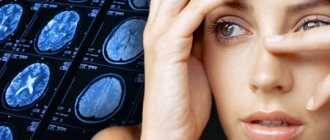Anxiety is a negative mood with feelings of restlessness, tension and fear. In moderation, such emotions are useful: they help mobilize strength and find a way out of extreme situations. But there must be a reason for concern and normally it lasts for a limited period of time.
If a person constantly experiences feelings of anxiety and worry for no reason, this may indicate the presence of a mental disorder. In the absence of help, constant stress wears out the nervous system and the body as a whole, which leads to a breakdown of adaptation mechanisms and the development of chronic diseases.
If you notice that you cannot relax for a long time, then you should think about visiting a specialist.
In pathological cases, a state of anxiety and restlessness for no reason is manifested by both mental and physical symptoms.
Mental symptoms:
- constant feeling of fear and excitement for no reason,
- poor concentration and attention,
- sleep disorders,
- emotional lability, irritability, tearfulness,
- inability to relax and fully engage in daily activities or communication,
- need to reassure other people that everything is okay. At the same time, words of support do not bring relief.
Physical symptoms:
- rapid breathing and heart rate,
- headaches, abdominal and heart pain,
- increased sweating,
- eating disorders: increased appetite or loss of appetite,
- weakness,
- trembling, chills,
- stool disorders: frequent urge, constipation,
- feeling of lack of air,
- nausea,
- muscle spasms and pain.
Unreasonable anxiety and restlessness intensify or subside from time to time. Exacerbations often accompany stress: conflicts, important events, illnesses. Normally, a person quickly recovers after the situation is resolved, but when upset, negative emotions do not go away.
The intensity of anxiety varies from mild to severe. The extreme is panic. If you ignore an anxious state for a long time without a reason, then panic attacks may join it. They strike unexpectedly and sometimes without a good enough reason, but after this episode the person begins to avoid situations similar to the one in which this happened: public transport, an elevator, or just a crowd of people. This greatly reduces quality of life and can lead to social withdrawal.
Causes of unreasonable anxiety and worry
The onset of anxiety disorder is influenced by heredity. It has been discovered that certain brain structures and features of biological processes play an important role in the occurrence of fear and anxiety. Personality characteristics, physical health problems, lifestyle and various types of addictions also matter. Sometimes causeless anxiety and worry have no reason. Negative feelings usually have a trigger—an event or thought that triggers an anxious response. However, most people are unaware of their triggers and believe their emotions are unfounded. In this case, only a specialist will help you understand why anxiety occurs for no reason.
There are a number of diseases whose symptoms include constant anxiety. With unreasonable fear and anxiety, the reasons may be as follows:
- Generalized anxiety disorder: persistent nervousness and worry about small things that are usually visible to others and last for 6 months or more. Begins in adolescence and intensifies with age.
- Obsessive-compulsive disorder: obsessive thoughts and fears that are accompanied by compulsive actions that do not bring relief. There is obsessive-compulsive neurosis - a person is indomitably haunted by memories that reproduce a traumatic situation.
- Phobias: irrational fear of any, even mundane, things. Accompanied by uncontrollable panic and physical manifestations.
- A panic attack is a painful and sudden attack of panic, which is accompanied by a fear of death and vivid somatic symptoms. Regular occurrence of panic attacks means the development of panic disorder.
- Post-traumatic stress disorder: occurs after a severe traumatic situation and is accompanied by high levels of anxiety, avoidance and flashbacks.
These are the most common examples, but pathological anxiety can be a symptom of other disorders or a consequence of unsuccessful management of stress. If you want to understand why you feel anxious for no reason, you should consult a doctor. Without finding out the main factor and working on it, it is impossible to restore health and mental balance.
How to get rid of anxiety
The problem of anxiety and the conditions associated with it has its own solution, and it can be dealt with. If you are overwhelmed by anxious thoughts, the first thing to do is make an appointment with a doctor. The main thing is to prevent anxiety from moving to another level when signs of depression appear, which is much more difficult to cope with.
Our Mental Health clinic is most often visited by those who are unable to independently get rid of anxiety that interferes with normal life and drives them into a dead end. Correcting feelings of anxiety usually does not take much time—experienced psychologists can handle this in a few sessions. The doctor will help to identify the cause that led to the alarming state and prescribe the course of necessary treatment.
The doctors at our clinic will help you overcome feelings of anxiety, find peace of mind, and restore the joy of communicating with others and the world. Signing up for a consultation today means your peaceful life tomorrow. If you live in another city, then remote consultations will help you.
| | Learn more about treating anxiety disorders |
Does anxiety interfere with your normal life? Call us
What to do if you have causeless anxiety and worry
It's hard to live in constant stress. If you are experiencing causeless anxiety and fear, the following list will tell you what to do:
- Talk to someone you trust. This could be a relative, a close friend, a psychotherapist or a helpline employee. People are social creatures, so communication is a good way to relieve internal stress.
- Find a way to calm down quickly. There is not always someone nearby with whom you can share. Therefore, it is important to find a suitable method that will help you relax: breathing techniques, soothing music, aromatherapy, self-massage and more. If you cannot independently choose a technique that quickly helps with anxiety for no reason, a specialist will tell you what to do.
- Add physical activity to your life. It is a natural and effective remedy for anxiety. Moderate exercise relieves tension, reduces stress hormones and strengthens the nervous system. Get at least 30 minutes of exercise every day.
- Normalization of lifestyle. Get enough sleep, eat well, give up bad habits. This stabilizes physical performance and neurotransmitter levels, which helps maintain emotional balance.
- Start keeping a journal. Taking notes can help you identify patterns of anxiety flare-ups, understand the causes, and spot early signs of them. Also, thanks to this, you will begin to focus more on positive events that you may not have noticed before.
When worried for no reason, everyone who regularly encounters this wants to know what to do. There is no universal method, but the 5 steps listed above are recommended for every person with increased anxiety. This may be enough to alleviate symptoms. But if self-help techniques do not give the desired effect, then if you regularly experience anxiety for no reason, you need to find out what to do from a specialist.
How to help yourself with increased anxiety: recommendations from Moscow psychologists
Anxiety itself is common to most of us. A feeling of anxiety is a normal state in psychology and is considered as an adaptation mechanism that helps us overcome various stressful situations. Olga Borisova, a family psychologist, told us how to help ourselves.
“Anxiety naturally mobilizes the human body to solve problems. Our psyche is depleted, and we begin to lose strength, it becomes more difficult to cope,” says the psychologist.
Varvara S., a Muscovite with many children, turned to a family specialist for the first time. The woman experienced an inexplicable feeling of anxiety. “I am tormented by a state of internal discomfort. Even now I can’t find a comfortable position for a long time. Constant worry about the children, endless cooking and cleaning the apartment, this loan, damn it!” - says Varvara.
Psychologists worked with the woman and her family, they conducted diagnostics and identified the causes of this condition. Varvara was recommended a set of activities to help cope with her emotions. Some of them are quite universal for many.
- Physical exercise. Any physical activity can restore mental balance. Movement helps the body relax physically and psychologically. This could be physical exercise, you can dance, go for a walk alone or with friends.
- Breathing exercises. Increases attention, calms the nervous system and reduces stress. Start with your body: feel whether you are warm or cold, whether your position is comfortable. Straighten your back and straighten your shoulders. Breathe, paying attention to your inhalations and exhalations. Do this slowly, without jerking, concentrating on each breath. Try to increase your exhalation. Even if at this time anxious thoughts continue to overcome you, simply again turn your attention to your breathing and the state of your body. You can do this exercise for 10–15 minutes, or even 1–2 minutes when time is limited.
- Water procedures. A warm shower with strong water pressure will not only relax your muscles and improve blood circulation, but also calm your nerves. And half an hour in the pool will relieve stress after a hard day. Or turn on your favorite music and take a hot bath. The effect will be enhanced if you add a few drops of chamomile, lavender, mandarin or lemon balm essential oil to the water. If you don’t have time for long water procedures, wet your hands and run wet palms over your face, neck and shoulders. Cold water tones the skin well and calms the nerve receptors.
- Minimize the flow of information, especially negative information. Limit reading negative news and watching TV shows, as well as time devoted to gadgets.
- A glass of water or tea with honey. A glass of clean water will help restore normal heart rhythm and relax. You need to drink slowly - in short sips, taking short breaks between them. Swallowing movements calm the nerves, and sweets stimulate the production of “happiness hormones.”
- Get a massage. A professional massage therapist will, of course, ease nervous tension and eliminate muscle tension. But you can do a relaxing massage yourself. Many nerve endings are concentrated in the head. Sit comfortably and begin massaging your temples with smooth circular movements. Gradually move to the scalp. The fingertips should glide freely over the surface (in the direction of hair growth) and not stretch the skin. A ten-minute massage improves blood circulation, relieves stress and normalizes sleep. In addition, it stimulates hair growth and strengthens hair follicles.
At the last meeting, after 6 months of painstaking work, Varvara shared her thoughts. “After analyzing my condition, I realized that I simply cannot live without anxiety. This is how both my mother and grandmother lived. I thought about the fact that I teach my children the same thing, but I don’t want it. This is my main motive for working with anxiety,” says the woman.
Summing up the results of working with Varvara S.’s family, we can say that it is the unknown that often frightens us. Think about specific actions, for example, how can you influence the situation? How can you help? Think over your actions and start doing them - real things will distract you from restless thoughts.
«It is necessary to realize what causes anxiety. What are you worried about? Identify one or more moments that are the most “worrying” for you. Answer yourself the question: what can happen or the worst that can happen? What help or support can you then get, what solutions can you find in this situation? This internal representation of events will reduce your anxiety,” the psychologist recommends.
For reference:
28 city organizations work to support Moscow families: 25 “My Family Centers”, as well as the Crisis Center for Assistance to Women and Children, social rehabilitation centers for minors “Vozrozhdenie” and “Altufyevo”.
Center specialists work to restore relationships between children and parents, provide legal and psychological assistance, conduct trainings, developmental classes and much more. If necessary, targeted assistance is provided: social electronic certificates are issued for food, clothing and household appliances.
Detailed information about services can be found on the “My Family Center” portal page. For the convenience of Muscovites, an “Online Consultations” section has been created on the portal, where every city resident can leave a request and be contacted within one business day.
If you want to get support, better understand yourself and your personal guidelines, we recommend signing up for free webinars at the Moscow Service for Psychological Assistance to the Population on the website www.msph.ru or coming for a free face-to-face consultation with a psychologist at one of the service’s departments. The emergency psychological help line 051 (landline) and +7 (495) 051 (mobile) and psychological support chat are available 24/7. Details on the website www.msph.ru.
Source
Press service of the Department of Labor and Social Protection of the Population of Moscow
Anxiety attack: how it happens
Anxiety begins with a vague tingling sensation, like a tight hug that I won't get out of until I feel dizzy.
She doesn’t care where and with whom I am now and how much I resist. Little tingling waves wash over me until my blood thickens and begins to rush around like a treacherous sea current. The muscles from my head to my toes tense, and all I hear is a scream somewhere inside me, trying to break out. Such sensations may seem like a slow trickle, but more often they attack me quickly, like a flash. There may be some reason for them or it all happens out of the blue. To those who have never experienced anxiety attacks, I seem strange, because my behavior suddenly changes dramatically. What is wrong with me? I'm struggling with this. But the anxiety still begins. On other days, anything can be a reason for it.
All. What. Anything.
Traffic. Sounds made by exhaust pipes. Cigarette smoke reaching me from car windows. Sun. Someday it will explode. Perhaps today. It's too bright, too warm. And if the sun is hidden, then most likely a hurricane is approaching. It can sweep through the city and destroy everything. The clouds are too dark and the sky also seems ominous. I can't stand gatherings. Everywhere I go, people are everywhere. The proximity of people. They are very close. Too close. I turn into nothing, and they move freely around me, and there are no chains on them. I am trapped. No exit.
How to cope with an attack?
It's difficult, but possible.
Slow breathing helps to cope with a rapid heartbeat and shallow breathing, which are both symptoms of a panic attack and its provocateurs. By breathing slowly, you send a signal to your brain to calm down. This is one of the most effective ways to stop a panic attack.
Focus on your breathing. Inhale for one-two-three-four, hold your breath for one second, exhale for one-two-three-four.
Choose one object that is close and direct all your attention to it. Mentally describe the color, size, shape, how it feels, how it moves or can move. For example, you can watch the hand of a clock move.
It is also important to learn to “devalue your panic.” When you feel fear rolling over you in waves, relax and accept this state. Don't resist. Meet panic with the words “Well, let it be!”, “Yes, I feel it, but I don’t care,” “And anyway, why is it so weak?”, “Is that all?” Take the onset of panic calmly. This will prevent your body from releasing adrenaline. And when you stop the attacks several times in this way, they will eventually disappear completely.
Generalized anxiety disorder, symptoms
Anxiety is a poisonous seed, a weed. I don't want it growing in my garden. Her attacks may have started with that incident in class many years ago, or perhaps they were caused by subsequent bullying. Or maybe it was my parents' messy divorce, or maybe it was because I was so fat that I never felt at home in my own olive skin. Or the traumatic loss I suffered during my teenage years, when I desperately wanted to find my place in the world and fought tooth and nail for it.
All of the above could have no significance, or all such cases, mixed with each other, turned into one carcinogenic mass. The source doesn't matter. One thing after another, weed after weed, fear and worry and wasted time - and it all accumulated until the weeds overtook my beautiful garden, my soul. Until I began to feel internally terrible. Sometimes dead. And sometimes I didn’t feel anything at all.
Weeds, no matter how long I panic about them, will never become anything beautiful. I know this - but still. I give up not because I can’t fight, but because at times I don’t know how to do it. Anxiety looks for cracks, weak spots in my mind and in what makes me human. Her only job is to manipulate everything I believe in until I can no longer discern what is right and what is wrong. I lost countless hours in the dark of night feeding this monster, knowing full well that nothing good would come from my worry. Knowing that every time I only make myself worse. And then, to the fullest, worrying about that too.
Anxiety doesn't care. Absolutely.
When I'm curled up in a ball, suffering from insomnia, or fighting the urge to fly out of a room full of people, anxiety whispers all sorts of lies in my ear until my thoughts are no longer mine. Now they belong to anxiety. My world of mostly normal fears (clowns, farm equipment, mirrors, the usual stuff) expands into something too big to overcome. This kind of life is completely exhausting, and there is no end in sight - the whole cycle repeats itself over and over again. But I don’t know how to fix things, how to fix myself. I only know that one of us must disappear - me or anxiety.










